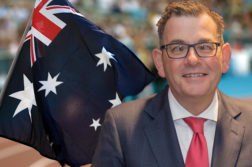Remember Lehman Brothers? It’s hard to believe that the US merchant bank’s spectacular collapse was just eight short months ago. When Lehman hit the wall last September, the US was already in recession. For several days, the world’s banking system teetered on the brink as policy-makers in Washington, New York and London struggled to come to grips with the magnitude of the panic.
Fast-forward to now and you can see the havoc the global financial crisis has wreaked on world economies. Countries that seemed boundlessly prosperous have experienced their sharpest economic contractions since the dark days of 1933. Annualised falls of 3, 4 and 5 per cent and higher were the norm for the rich world’s economies in the first quarter of this year.
And yet, somehow, Australia has dodged the bullet. Certainly, the economy here is in a downturn, with business confidence and investment far below the levels of those heady days of 2007. And the official Treasury forecast remains for Australia to experience a recession in 2009–10.
However, as yesterday’s GDP figures show, the "lucky country" has again pulled out the winning lottery ticket. Although growth has stalled, government tax revenues have collapsed and unemployment has risen sharply, the Australian downturn has so far been a mild ailment, rather than the kind of economy-wide sickness that has struck down America, Britain and Japan, or the near-terminal disease that has afflicted smaller countries like Iceland, Ireland and Estonia.
You may not be ready to believe this — Malcolm Turnbull and Joe Hockey certainly aren’t — but one of the key reasons for the relative mildness of Australia’s recession is Kevin Rudd and Wayne Swan’s economic policy.
Really? Yes, really.
It might have been luck, or a fortunate judgment call, or simply sound counter-cyclical Keynesian policy, but Swan and Rudd’s brave and politically risky decision to spend up big last October and again earlier this year put a floor under Australian consumer sentiment. You might hate the very idea of the Government borrowing money to send millions of ordinary Australians cheques. The Coalition does. But the evidence is now in. The cash splash worked.
How can we tell? There is a range of evidence available for those prepared to look. First up, the official figures. The Australian Treasury — sadly, an increasingly politicised government department — estimates that Australian growth would have been negative 1.1 per cent in the December quarter without all that deficit spending. Instead it was only half that bad, coming in at negative 0.6 per cent. On yesterday’s GDP figures, the Australian economy would have shrunk by 0.2 per cent in the March quarter without the stimulus. Instead, it recorded modest growth of 0.4 per cent. In other words, Australia has avoided the dreaded two successive quarters of negative growth that economic commentators insist on calling a "technical recession".
Secondly, let’s look at the size of that fiscal stimulus. The Federal Government has spent an amount that nears 2 per cent of our total GDP since September last year — many tens of billions of dollars in cold hard cash injected straight into consumers’ pockets. As yesterday’s growth figures show, that turns out to have made a real difference to consumer spending, which was up 0.6 per cent in the March quarter. That’s a big increase in the context of the rest of the economy. Businesses, for instance, continue to cut back on their investment.
Economists lined up to support the government’s spending yesterday. Peter Martin in The Age quoted TD Securities’ Stephen Koukoulas as saying "our leaders decided to go early, go hard and go consumer … it’s great to see policymakers make a difference". Chris Richardson from Access Economics told The Australian‘s David Uren that "there is now clear evidence that the stimulus spending has worked".
Perhaps now the Rudd Government will be able to use this news to reframe the economic debate. As I wrote last month, Rudd and Swan have done a poor job of selling the budget, and in consequence have lost control of the economic debate. This has allowed the Coalition to gain traction with its scare campaign about government debt. As George Megalogenis pointed out today in his blog at The Australian, the Government’s fancy linguistics — using phrases like "temporary deficits" and refusing to name actual debt figures — have backfired. A more straightforward explanation that it was borrowing to spend money to prop up the economy might have been much more effective.
After all, the vicious cycle of economic contraction is all too easy to understand. Recessions are downward spirals of consumption, production and investment. As consumers stop spending and inventories pile up, businesses order less stock and put off investing for the future. The result is less production and eventually fewer jobs. Most Australians have experienced at least one recession; it shouldn’t be too hard to explain why trying to prevent or at least ameliorate the next one is a good idea.
It’s true, of course, that the Rudd Government inherited a budget in surplus. However, as economic commentators realise — but few in the Coalition accept — the tax cuts of the Howard years were largely financed by a massive spike in export earnings and tax revenues, courtesy of the mining boom. This meant the budget was not nearly as healthy as it looked. And, as Miriam Lyons pointed out on ABC TV’s Q&A last week, one of the reasons for this surplus was a decade of under-investment by the Howard Government in critical infrastructure — not just in hard infrastructure, but also in universities, hospitals and schools. A large part of Labor’s huge infrastructure spend is about making up for that lost decade.
Labor — and Australia — have also lucked out with the strength of the Australian banking sector. No Australian banks have needed saving and the cost to the Commonwealth of guaranteeing their loans has been modest. Despite a huge house price bubble that is still to unwind, banks here never got quite as carried away with risky home lending and derivatives leveraging as their British and American counterparts. Moreover, because the Reserve Bank remained hawkish on inflation well into 2008, interest rates here had much further to fall than in the US or UK, where they are now at nearly zero. This meant Australian policy-makers had a lot of ammunition to throw at the onrushing downturn.
It has still required a lot of political courage to fire it. Those who claim Kevin Rudd is a cautious and calculating leader are sometimes fooled by the Prime Minister’s avowed penchant for micro-management and bureaucratic lever-pulling. In reality, Swan and Rudd took a series of bold and quite risky policy decisions on the economy — decisions for which the Coalition is still attacking them.
The Opposition’s desperate attacks on the "cash splash" and "Labor’s debt" are definitely resonating with a portion of the electorate. No-one likes to be in debt. But many Australians make sensible debt-financed investments for their future — for instance when they take out a mortgage to buy a house. Labor could reframe the debate by putting it in these terms. If the Rudd Government is going to win a future election on the issue of economic management, it needs to tackle the Coalition’s economically dubious debt-attack now.
The cash splash is working. Labor should say so.
Donate To New Matilda
New Matilda is a small, independent media outlet. We survive through reader contributions, and never losing a lawsuit. If you got something from this article, giving something back helps us to continue speaking truth to power. Every little bit counts.



